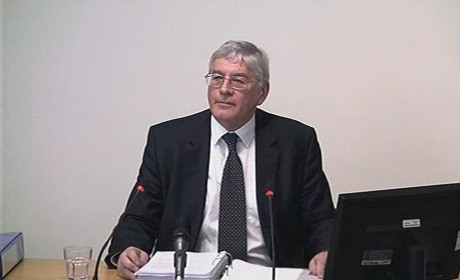
Dick Fedorcio: 'The News of the World was one of the most challenging media outlets to deal with'
A Metropolitan police communications chief under investigation about his links to former News of the World executive Neil Wallis has told the Leveson inquiry that there was "no indication" that Wallis was not a suitable candidate for a contract at the police force.
In written evidence, Met director of public affairs Dick Fedorcio said: "I felt there were no reasons as to why I should not go ahead and discuss the possibility of engaging the services of Neil Wallis."
Wallis is a former executive editor of the News of the World and was paid £24,000 by the Met for communications advice between October 2009 and September 2010. He was arrested on suspicion of phone hacking last July.
Fedorcio, who is in charge of the Metropolitan police's media strategy, is on extended leave pending an Independent Police Complaints Commission investigation into the awarding of the contract to Wallis. The communications chief was criticised by MPs last July for apparently demonstrating "no due diligence" in conducting proper checks on Wallis before he was given the job by Scotland Yard.
Fedorcio wrote in his evidence to the inquiry: "On a professional basis, Neil Wallis fully met my requirements; we knew nothing about Neil Wallis that would be to his detriment; there was no indication that he was suspected of involvement in criminality - he had never been named, implicated or questioned regarding phone hacking; he had never been required to resign over the issue at the paper; the phone-hacking investigation was closed; and, Nell Wallis was no longer employed by the News of the World and was now setting up his own media business.
"In addition John Yates told me that he had spoken to Neil Wallis to ask if there was anything that was going to emerge at any point about phone hacking that could ’embarrass the MPS, me, him or the commissioner’. John Yates had received ’categorical assurances that this was the case’.
He added: "Neil Wallis never had unescorted access to our premises, and the matters discussed or advised on were all matters of public record. His role did not cover any operational or investigative matters. He had no access to any MPS systems. Therefore I did not believe that personal vetting was necessary, and it was never raised with me by anyone else."I did not believe that personal vetting was necessary, and it was never raised with me by anyone else"
"I first became aware that Neil Wallis was of interest to the MPS in relation to phone hacking on the day of his arrest. I discussed with the commissioner how we should make public the details of the MPS contract without compromising the phone-hacking investigation or Mr Wallis.
"The commissioner advised me that, because of my involvement in awarding the contract, I should not be involved in any decisions on this and it should be left to the deputy commissioner and my deputy director."
On the wider issue of dealing with the News of the World, Fedorcio added: "The News of the World was one of the most challenging media outlets to deal with because of the nature and content of their coverage, propensity for sting operations and their reluctance to approach the MPS with questions or requests for operational support until the last minute on a Saturday.
"This was fuelled by a lack of trust and the fear that their exclusive story would be undermined by premature police intervention or leaked to another media outlet. From an MPS perspective this was not a satisfactory situation."
Earlier today, a Scotland Yard communications officer who handled media queries about the phone-hacking investigation admitted that the Metropolitan Police press office might have inadvertently misled journalists.
Senior information officer Sara Cheesley told the Leveson inquiry that the lines being given to the media about the extent of voicemail interception and the police operation were only as good as the information the press officers received from the operational side of the force.
Asked if, between the Guardian breaking the hacking story in summer 2009 and arrests being made in 2011, the media might have been inadvertently misled, Cheesley replied: "Yes, clearly."
She said: "We can only draft press lines based on the information we're given from the operational side. If it transpires there is information that moves those press lines on then yes."
Free daily newsletter
If you like our news and feature articles, you can sign up to receive our free daily (Mon-Fri) email newsletter (mobile friendly).











